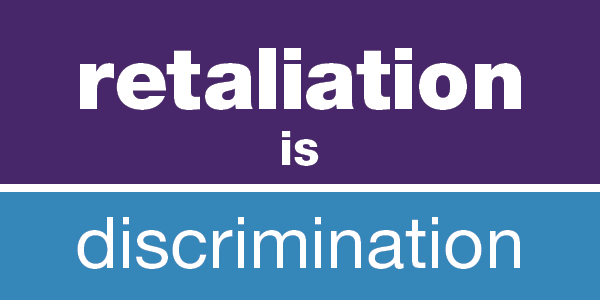Anyone involved in discrimination complaints and investigations should be free to make complaints, participate in interviews, oppose a claim, and provide information to investigators or public agencies without fear of reprisal by their employer. Despite prohibitions against employer retaliation, a significant portion of discrimination claims filed with public enforcement agencies each year include a retaliation claim.
The Vermont Fair Employment Practices Act (FEPA) prohibits employers from discharging or discriminating against any employee because the employee:
- has opposed any act or practice that is prohibited under FEPA;
- has lodged a complaint or has testified, assisted, or participated in any manner with the Attorney General, a State's Attorney, the Department of Labor, or the Human Rights Commission in an investigation of prohibited acts or practices;
- is known by the employer to be about to lodge a complaint, testify, assist, or participate in any manner in an investigation of prohibited acts or practices;
- has disclosed his or her wages or has inquired about or discussed the wages of other employees; or
- is believed by the employer to have acted as described above.
However, FEPA also provides that these protections do not shield employees from being discharged by their employer for “good cause shown.”
Federal laws enforced by the Equal Employment Opportunity Commission (EEOC) also prohibit punishing job applicants or employees for asserting their rights under employment anti-discrimination laws. Asserting these rights is called "protected activity," and it can take many forms. “Protected activity” can include:
- filing or being a witness in a discrimination charge, complaint, investigation, or lawsuit
- communicating with a supervisor or manager about employment discrimination, including harassment
- answering questions during an employer investigation of alleged harassment
- refusing to follow orders that would result in discrimination
- resisting sexual advances, or intervening to protect others
- requesting accommodation of a disability or for a religious practice
- asking managers or co-workers about salary information
- other acts to oppose discrimination, as long as the employee was acting on a reasonable belief that something in the workplace may violate anti-discrimination laws, even if they did not use legal terminology to describe it.
Depending on the facts, if an employee has engaged in protected activity, an employer could commit unlawful retaliation if it then:
- reprimands the employee or gives a performance evaluation that is lower than it should be;
- transfers the employee to a less desirable position;
- engages in verbal or physical abuse;
- threatens to make, or actually makes reports to authorities (such as reporting immigration status or contacting the police);
- increases scrutiny;
- spreads false rumors, treat a family member negatively (for example, cancel a contract with the person's spouse); or
- makes the person's work more difficult (for example, punishing an employee for an EEO complaint by purposefully changing his work schedule to conflict with family responsibilities).
If you believe you may be a victim of workplace harassment or discrimination on the basis of any legally protected category or categories, find more information:


